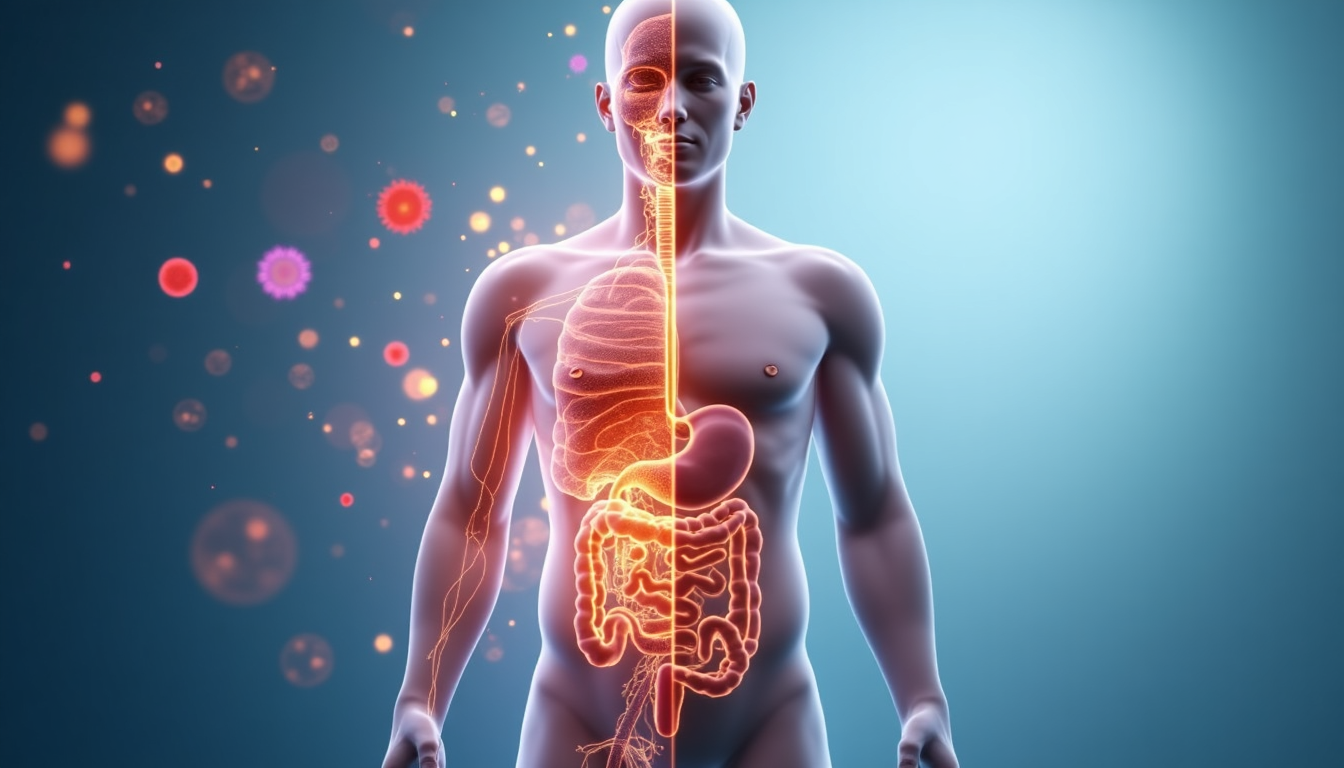
Hormone Imbalances and Sleep: Why Cortisol and Progesterone Matter
Hormone imbalance and sleep is often an overlooked relationship when considering sleep problems. Difficulty falling asleep, waking in the night, or feeling unrefreshed in the

This article looks at the important of the gut microbiome and the link with your overall health including your immunity and mental health.
The gut plays a central role in immunity and overall wellness because it’s not just a digestive organ; it also houses a complex and dynamic community of trillions of microbes, collectively known as the gut microbiome. This microbiome, along with gut-associated lymphoid tissue (GALT), creates a protective system that influences the immune system, mental health, and metabolic function.
Gut health and Immunity
The gut lining acts as a physical barrier, preventing harmful bacteria and toxins from entering the bloodstream. A healthy gut lining is critical for immune defence. Beneficial gut bacteria produce metabolites, like short-chain fatty acids (SCFAs), which support anti-inflammatory responses and strengthen immune cell function. An imbalance in gut bacteria, known as dysbiosis, can lead to “leaky gut,” where the intestinal lining becomes permeable, allowing toxins to enter the bloodstream and potentially trigger autoimmune responses.
The Gut Associated Lymphoid Tissue (GALT) in the gut contains a large number of immune cells that help identify and neutralise pathogens. It’s estimated that about 70% of the body’s immune cells reside in the gut. A balanced gut microbiome helps control inflammation through various signalling pathways. Chronic gut inflammation is linked to autoimmune diseases, cardiovascular disease and many health concerns.
Gut health and mental health
The gut microbiome plays a fascinating role in mental health, impacting mood, cognition, stress responses, and even behaviours. This connection is largely explained by the gut-brain axis, a complex communication network linking the gut and brain via neural, hormonal, and immune pathways. The Vagus Nerve is the main nerve connecting the gut and the brain, transmitting signals from the gut directly to the brain. Microbes can stimulate the Vagus Nerve, influencing mood and stress responses.
Gut bacteria produce neurotransmitters, like serotonin, dopamine, and gamma-aminobutyric acid (GABA), which plays a critical role in mood regulation, motivation, and emotional stability. Remarkably, around 90% of the body’s serotonin, a mood-regulating neurotransmitter, is produced in the gut. The microbiome also interacts with the immune system, which produces cytokines that affect brain activity. Inflammatory signals triggered by gut bacteria can influence mental health conditions such as depression and anxiety.
Dysbiosis, or an imbalance in gut bacteria, has been linked to increased levels of inflammation, which is a known risk factor for depression. Gut bacteria produce metabolites, such as short-chain fatty acids (SCFAs), that have anti-inflammatory effects, helping to regulate mood. Certain bacterial strains, such as Lactobacillus and Bifidobacterium, have shown anti-anxiety effects, possibly by producing GABA. Interestingly, dysbiosis can trigger the release of cortisol, the primary stress hormone, affecting mood and anxiety levels.
Introducing the GI Effects Microbiome Test
An imbalanced gut microbiome, or dysbiosis, can lead to a range of symptoms that affect digestion, immunity, mental health, and more. Below are some of the common symptoms that may arise but this is by no means an exhaustive list:
The GI Effects Microbiome Test looks at some of the key areas for gut health that have been discussed above, including:
You can see how this is summarised below:

Take a look at the full sample report below:
You can order the GI Effects Microbiome test by clicking the link below:
Alternatively, if you are looking for a full profile that also covers inflammatory markers you may want to consider the GI Effects Comprehensive Profile:
An imbalanced gut microbiome can cause diverse symptoms, from digestive discomfort and immune issues to mental health challenges and skin problems. If you’re experiencing a combination of these symptoms then do consider identifying the root cause of your problem through testing.
Finally, if you are concerned about your gut health, we also have a team of fully qualified Functional Medicine practitioners, Nutritional Therapists and GP’s on hand that we can refer you to to help.

Hormone imbalance and sleep is often an overlooked relationship when considering sleep problems. Difficulty falling asleep, waking in the night, or feeling unrefreshed in the

‘Detox’ has become one of the most misunderstood concepts in modern wellness. For many people, it brings to mind juice cleanses, restrictive diets or short-term resets promising quick results. Yet the body’s true detoxification systems are far more complex — and far more intelligent — than any cleanse.

Anxiety and gut health are closely linked through the gut–brain axis. Research suggests the gut microbiome, neurotransmitters and genetics may influence stress responses and emotional well-being. Exploring gut microbiome and nervous system insights can help build a more personalised understanding of anxiety.

Strange symptoms can puzzle anyone. Your body might show signs ranging from headaches and skin rashes to digestive problems and anxiety. Doctors sometimes struggle to explain these mysterious health issues that affect millions of people worldwide.
Please do not return samples to the laboratories that may arrive after Wednesday 27th March and up to and including Monday 2nd April.
The laboratories are closed from the 28th March – 2nd April for the Easter Holiday.